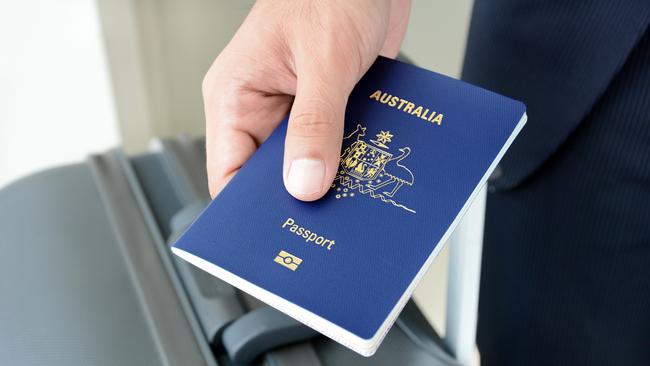January 1 new laws 2025: Centrelink, Medicare, aged care, visas, passport fee changes
From January 1, some Aussies are getting pay rises while others are getting access to more welfare payments. Others will be slugged with higher fees. See what’s afoot.
Money
Don't miss out on the headlines from Money. Followed categories will be added to My News.
Australians will start the New Year with fee hikes, changes to welfare payment, Medicare and other laws on January 1, 2025.
Here is a breakdown of what’s coming and what it means for your household:
PASSPORT FEES
Under legislation, passport fees are indexed annually on January 1 in line with the Consumer Price Index.
This indexed increase will see the cost of an ordinary 10-year passport rise from $398 to $412.
Aussies travelling to the UK will also need an Electronic Travel Authorisation (ETA), instead of just a passport from January 8. It costs $20 and allows multiple journeys to the UK for stays of up to six months over two years.

HEALTH AND MEDICARE
The Original Medicare Safety Net (OMSN) threshold will increase from $560.40 to $576, which is what you need to reach for Medicare to reimburse you 100 per cent of the Medicare Benefits Schedule.
The Extended Medicare Safety Net (EMSN) threshold will increase from $2544.30 to $2615.50. Once reached you can get 80 per cent of out-of-pocket costs.
The EMSN threshold for concession card holders and families eligible for Family Tax Benefit A will rise from $811.80 to $834.50. Once reached you can get 80 per cent of out-of-pocket costs.

From January 1, the Government will subsidise testing under Medicare for breast cancer gene 1 and 2 (BRCA) variant detection. Prior to the change, breast cancer patients had to meet certain clinical criteria. The amendments will remove these restrictions to support
testing in all breast cancer patients and determine patient eligibility for any relevant PBS treatment.
A new permanent Medicare subsidised item will also be introduced for MRI to diagnose myocarditis, and support the diagnosis of vaccine-induced myocarditis, including cases associated with Covid-19, and assist adverse events reporting to the TGA.
Medicare will also support mutation testing for patients with metastatic castration-resistant prostate cancer to help determine their eligibility for any relevant PBS treatment.
Duplex scanning services for erectile dysfunction will cease on January 1.
From January 2, the Medicare program and phone claim line will no longer be available 24-hours. Instead, it only be available Monday to Friday, 7am to 10pm, and 7am to 7pm on weekends.
CHEAP MEDICINES
From January 1, the First Pharmaceutical Wholesaler Agreement with the National Pharmaceutical Services Association over five years kicks in and means the rising costs of distributing medicines will not be passed on to consumers.
It delivers a 34 per cent increase in funding for wholesalers and includes an additional $135 million to manage onshore medicine shortages and more than $275 million for better access to specialised medicines.
The Agreement gives wholesalers financial certainty, allowing them to continue operations, meet their community service obligations and extend those standards to specialised medicines.
These obligations include supplying the full range of PBS medicines to pharmacies across Australia within 24 hours, despite location or cost.

CENTRELINK PAYMENTS
For single recipients of Youth Allowance with dependent children, payments will increase by $30.60 to a maximum rate of $845.80 a fortnight (including an energy supplement).
Partnered recipients of Youth Allowance without dependent children will receive a payment increase of $24.30, bringing the maximum rate to $670.30 a fortnight (including an energy supplement).
More than 600,000 carers will see an increase in Carer Allowance payments by $5.80, bringing the rate to $159.30 per fortnight.
Single or partnered recipients of Austudy with no dependent children will also see an increase to their payment, bringing their fortnightly total to $670.30 (including an energy supplement).
The maximum rates of ABSTUDY Living Allowance for Masters and Doctorate students will increase to $1285.40 a fortnight, and the parental income test threshold for Youth Allowance will see an increase to $65,189 a year.
CENTRELINK MEDICAL CERTIFICATES
Centrelink medical certificates can be up to 24 months from January 1 for patients unable to participate in work or other activities due to an illness or injury. The maximum exemption time is currently 13 weeks for anyone getting a Jobseeker payment, Youth Allowance for job seekers, single parenting payment when the youngest child turns six, or a special benefit for nominated visa holders.
Private health insurance extras also reset for millions of Aussies on January 1, so check with your policy provider.

AGED CARE
General workers covered by the Aged Care Award receive a three per cent increase to their minimum pay rate ranging from 2.3 to 13.5 per cent.
The Home Care Package subsidy on January 1 increases by 0.93 per cent to pass on the Fair Work Commission Stage 3 decision to increase award wages for eligible workers.
EDUCATION
Claims open on January 1 for the Tertiary Access Payment, which helps with the cost of moving from a regional or remote area for first year of tertiary study. Eligible recipients could get $5,000 in two instalments if from an outer regional or remote area, or $3,000 as one lump sum if they are living in an inner regional area.
STUDENT VISAS AND FOREIGN STUDENT CAPS
The Department of Home Affairs will no longer accept Letters of Offers from individuals applying in Australia for a Student visa.
Onshore applicants will be required to include a Confirmation of Enrolment (CoE) at the time of application.
The change will only impact applications lodged on or after January 1, 2025. Visa applications lodged before that date using only a Letter of Offer from an education provider are not affected.
Not providing a CoE at the time of application will make an application invalid. Visa decision makers cannot assess an invalid application. An associated bridging visa cannot be granted where the substantive visa application is not valid.
On January 1, 270,000 new international student commencements will be allowed as part of the new cap called the National Planning Level.
WAGE THEFT WILL BE A CRIME
Intentionally underpaying employees’ wages or entitlements will become a criminal offence under the Fair Work Legislation Amendment (Closing Loopholes) Act 2023.
It will hold employers accountable for deliberate noncompliance and fines will be millions of dollars with potential imprisonment for individuals. Penalties include up to 10 years in prison and a $1.565 million fine for individuals, and a $7.825 million penalty for companies.

MANDATORY CLIMATE REPORTING
Many large Australian businesses and financial institutions will need to prepare annual sustainability reports with mandatory climate-related financial disclosures.
CLEANER CARS
The New Vehicle Efficiency Standard (NVES) requires car manufacturers to meet a CO2 reduction target, promoting fuel-efficient and low or zero-emission vehicles starting January 1.
Manufacturers can sell any vehicle but must balance less efficient models with more efficient ones.
Meeting or exceeding the target earns credits. Those who exceed the target allows two years to trade or generate credits to avoid penalties. A new government regulator will oversee the standard, and targets will be reviewed every five years.
ENGINEERED STONE BAN
A ban on the importation of engineered stone benchtops, panels and slabs will be in place.
FOREIGN INVESTMENT
Recent changes to Australia’s Foreign Resident Capital Gains Withholding (FRCGW) regime kick in and impact both Australian and foreign entities involved in property transactions.
Under contracts entered into from January 1, buyers will be required to withhold 15 per cent (previously 12.5 per cent) of the contract price and remit it to the ATO unless the seller obtains a Clearance Certificate prior to settlement.
The current rule where Aussie residents selling property must provide a clearance certificate to the purchases before or at settlement where the value of the property is greater than $750,000 will also be scrapped.
Contracts entered into before January 1 will not be affected, however if an option has been entered into before January 1, but is exercised after the date, the new regime will apply to the resulting contract.
GOVERNMENT WEBSITES
New government websites need to meet three new standards to improve accessibility, consolidate entry points and maintain a quality experience for the people using them.
The three new standards are digital inclusion, access, and performance of new government websites. Senator Katy Gallagher emphasised the importance of user-friendly digital services in July this year saying “we want to ensure that all our websites and apps work well and are simple to use”.
Originally published as January 1 new laws 2025: Centrelink, Medicare, aged care, visas, passport fee changes
Read related topics:Cost of Living



